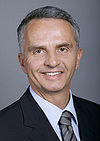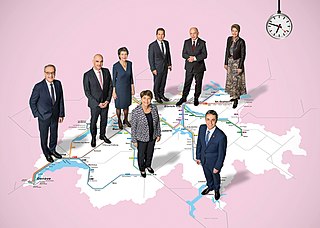
The Federal Council is the seven-member executive council that constitutes the federal government of the Swiss Confederation and serves as the collective head of state and government of Switzerland. It meets in the west wing of the Federal Palace in Bern.

The Christian Democratic People's Party of Switzerland was a Christian-democratic political party in Switzerland. On 1 January 2021, it merged with the Conservative Democratic Party of Switzerland (BDP/PBD) to form The Centre, which now operates at the federal level. The Christian Democratic People's Party will continue to exist at the cantonal level as individual local and regional parties determine their status.
The Executive Council is the executive of the Swiss canton of Bern.

Didier Eric Burkhalter is a Swiss politician who served as a Member of the Swiss Federal Council from 2009 to 2017. A member of FDP.The Liberals, he was President of the Swiss Confederation in 2014.

Elections to the Swiss Federal Assembly, the federal parliament of Switzerland, were held on Sunday, 21 October 2007. In a few cantons, a second round of the elections to the Council of States was held on 11 November, 18 November, and 25 November 2007. For the 48th legislative term of the federal parliament (2007–2011), voters in 26 cantons elected all 200 members of the National Council as well as 43 out of 46 members of the Council of States. The other three members of the Council of States for that term of service were elected at an earlier date.
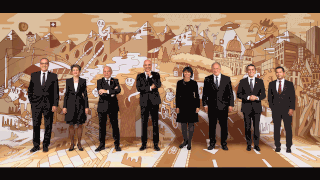
In Swiss politics, the magic formula is an arithmetic formula for dividing the seven executive seats on the Federal Council among the four coalition parties. The formula was first applied in 1959. It gave the Free Democratic Party, the Catholic Conservative Party and the Social Democratic Party two seats each, while the Party of Farmers, Traders and Independents received one seat.
On December 12, 2007, all seven members of the Federal Council, the government of Switzerland, were elected by the joint chambers of the Federal Assembly for the 2008–2012 term of office. Councillors are elected individually by an absolute majority of votes, with the incumbent councillors defending their seats in descending order of seniority.

The Conservative Democratic Party of Switzerland was a political party in Switzerland from 2008 to 2020. After the 2019 general election, the BDP had three members in the National Council.

On 10 December 2008, the Swiss Federal Assembly elected Ueli Maurer as successor to Federal Councillor Samuel Schmid. Schmid resigned on 12 November 2008 after a number of controversies, officially citing health and personal reasons. Maurer took office on 1 January 2009.
Two by-elections to the Swiss Federal Council were held in Switzerland on 22 September 2010, after Federal Councillor Moritz Leuenberger (SP) announced he would leave the Federal Council effective 31 December 2010 and Federal Councillor Hans-Rudolf Merz on 6 August 2010 announced his intention to retire effective late October 2010. The by-elections resulted in the elections of Simonetta Sommaruga from the SP and Johann Schneider-Ammann from the FDP, resulting in no change in the partisan composition of the council. It also resulted in the first majority of women on the Federal Council in its history, with Sommaruga joining Micheline Calmy-Rey, Doris Leuthard and Eveline Widmer-Schlumpf.

Federal elections were held in Switzerland on 23 October 2011. All of the Federal Assembly were to be elected: all 200 seats in the National Council and all 46 seats in the Council of States.
An election for all seven members of the Federal Council, the government of Switzerland, was held on 14 December 2011, following the federal election on 23 October 2011. Micheline Calmy-Rey announced she would not run for re-election to the council. According to a traditional informal convention, the successor has to come from the French-speaking or Italian-speaking part of Switzerland. The candidates for her post announced by their respective cantonal sections are Alain Berset (Fribourg), Pierre-Yves Maillard (Vaud), Stéphane Rossini (Valais), and Marina Carobbio (Ticino).
Elections were held to the Council of States of Switzerland in October and November 2007 as part of the 2007 federal election. All 46 members of the Council of States were elected from all cantons of Switzerland. The first round was held on 21 October. In eight cantons, not all seats were filled in the first round, and a second round was held on 11 November, 18 November, or 25 November.

Federal elections were held in Switzerland on 18 October 2015 for the National Council and the first round of elections to the Council of States, with runoff elections to the Council of States being held in various cantons until 22 November.
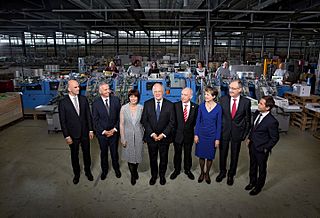
An election for all seven members of the Federal Council, the Government of Switzerland, was held on 9 December 2015, following the federal election on 19 October 2015, for the 2016–2020 term.

Ignazio Daniele Giovanni Cassis is a Swiss physician and politician who has served as President of the Swiss Confederation since 1 January 2022. A member of FDP.The Liberals, he has been a Member of the Swiss Federal Council since 1 November 2017. Cassis was elected to the Federal Council on 20 September 2017 following the resignation of Didier Burkhalter. He has headed the Federal Department of Foreign Affairs since he took office. On 8 December 2021, Cassis was elected President of the Swiss Confederation for 2022.
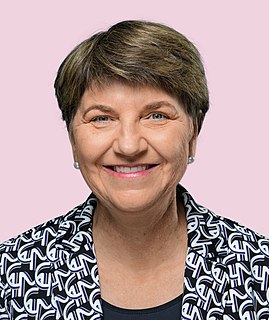
Viola Patricia Amherd is a Swiss politician who has served as a Member of the Swiss Federal Council since 2019. She is the head of the Federal Department of Defence, Civil Protection and Sport. Amherd was a member of the Christian Democratic People's Party (CVP/PDC) until 2021, when it merged with the Conservative Democratic Party (BDP/PBD) to form The Centre (DM/LC), which she joined.

The Centre or Alliance of the Centre is a centre-right political party in Switzerland. It was formed through the merger of the Christian Democratic People's Party of Switzerland (CVP) and the Conservative Democratic Party of Switzerland (BDP). Following the formal merger of the parties on 1 January 2021, it has 28 of 200 seats in the National Council and 13 of 46 seats in the Council of States. Viola Amherd is the party's representative on the Federal Council.

